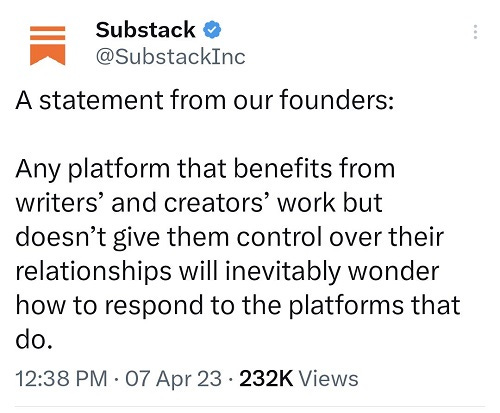Elon's War on Newsletters
Including mine.
Late last year, I wrote about Elon Musk’s highly-publicized purchase of Twitter. I explained how, unlike a lot of people, I didn’t have particularly strong feelings about him owning the platform (just like I didn’t care who owned it previously). Sure, I thought Musk was making some early mistakes in how he was running things (I pointed a few of those mistakes out), but I also made it clear that as the private owner of the company, they were his mistakes to make:
My prevailing view of Twitter is that it’s a private business, so whoever owns it can do with it whatever they want… including shutting it down and/or stripping it for parts...
Five months later, that view hasn’t changed. What has changed is Twitter’s user experience. It’s far worse than it ever was prior to Elon taking the reins — exhaustively so.
Ridiculous policy and feature changes, combined with a steady flow of inexplicable technical problems, have made me question at times whether this acquisition was premised on a one-dollar “Trading Places” style wager between Musk and some other filthy-rich mogul… as part of an elaborate social experiment.
One of the biggest complaints has been Twitter’s new verification policy. Becoming “verified” used to entail an individual or organization providing Twitter with official identification or documentation proving that they are, indeed, who they claim to be on the platform. Once verified, a little blue check-mark icon appeared next to the user’s account name. Granted the program had some problems, but the feature was quite helpful for weeding out poser-accounts.
Now, Twitter verification has absolutely nothing to do with verifying one’s identity. Instead, the blue check-mark is granted to anyone who pays Twitter $8 a month. In other words, it’s a completely pointless marker beyond letting others know that Twitter charges your credit card. It has invited identity confusion that didn’t previously exist, compelling Elon to embarrassingly workshop ideas for how to fix the problem he needlessly created.
Another dud has been the “For You” tab. It’s supposed to present users with tweets somehow deemed to be of special interest to them. But more often than not, it displays posts from accounts that the targeted user doesn’t even follow, and couldn’t care less about. And it’s especially prone to presenting tweets from Musk himself.
Over the weekend, Twitter rolled out its most aggravating change yet, at least as far as I’m concerned. That’s because it targeted my writing — specifically the writing I do for this newsletter and other sites — in how I’m able to share it with others.
Apparently, Twitter identified Substack, the popular online forum I and many other writers use for our newsletters, as a serious competitive threat — a threat so significant that they employed punitive measures, without warning or explanation, to dismantle compatibilities between the two platforms.
The move was apparently prompted by Substack’s introduction of a new feature called Substack Notes, which shares some common characteristics with Twitter, including short-form, embeddable posts.
First, Twitter severed writers’ ability to embed tweets inside their Substack articles (something I do all the time, including for this newsletter’s weekly “Random Thought” section).
Next, they blocked Twitter users from liking, replying to, and retweeting (aka sharing) tweets that contain a Substack link. For example, when I publish a Daly Grind newsletter, I can still post a link to it on Twitter (to promote it), but now no one can like, reply to, or share the tweet with their followers (to further promote it). This makes it virtually impossible for a Substack article to go viral on Twitter.
Next began the targeting of Substack’s Twitter account, and the Twitter accounts of the company’s owners. Their tweets (including the one below) were given the same treatment as those containing Substack links.
And at some point, Twitter’s search algorithm was altered to return results for the generic word “newsletter” whenever someone searches for a specific Substack domain or URL.
This targeted assault not only strikes me as unbelievably petty, but also counterproductive. These two platforms have had a mutually beneficial relationship. Being able to embed tweets in Substack articles drives more traffic to Twitter, and being able to retweet Substack articles (as with any other online article) builds Twitter users’ followings. These are both good things for Elon’s company, but he now apparently sees more cons than pros in keeping the relationship friendly.
The move would also seem to directly contradict the primary reason Elon gave for buying Twitter in the first place. He’s claimed over and over again that it was done in the interest of promoting free speech, and that he is a free-speech absolutist fighting for independent voices that don’t enjoy establishment-media backing. He’s even framed Twitter, under his leadership, as “a battle for the future of civilization.”
Frankly, I never bought any of it. Elon has a long history of bowing to censorship rules and running interference for authoritarian governments when it comes to his international business interests (most notably with China). And even in his early days and weeks as Twitter’s owner, he demonstrated that he was quite willing to punish accounts that mocked or criticized him. While his fans hailed him for reactivating a lot of suspended accounts (mostly troll accounts that had previously violated Twitter policies), and blowing the lid off the secret suppression of voices under previous owners (a project he called the Twitter Files), Elon was already promising similar suppression efforts of his own. He reportedly even ordered his tech team to create an algorithm to inorganically boost his own tweets over those of other prominent public figures.
And ironically, Elon’s current throttling of Substack is harming some of the independent journalists he entrusted with his Twitter Files project, who make their primary living off of Substack. In fact, one of them just left Twitter over Elon’s stunt.
Yeah, I suspect Elon’s interest in Twitter has always been more about personal attention for himself — a $40 billion, 450-million-user megaphone for trolling his critics and pursuing his hobby of spreading conspiracy theories — than it’s ever been about free-speech advocacy. Based on some of his business decisions since the purchase, I’m not convinced making money with the platform is a priority either.
Again, as the owner of the company, that’s his right; he can do with Twitter whatever he wants. The company doesn’t have to serve the public good, nor does it have to be profitable.
I just hope people — including those who’d previously bought into the narrative of Elon being a “free speech” hero — can finally lay rest to the notion that this venture was one of virtue. It clearly wasn’t.
As a believer in free markets, I wish Substack the best of luck with Substack Notes (I’m inclined to give it a try). Likewise, I hope Twitter gets its act together, because right now it’s a mess.
Update (4/10): After days of online blow-back, Twitter appears to have lifted some of the punitive measures described above. We’ll see where things go from here.
Have thoughts? Let me hear them in an email or in the comment section below.
Chris Stirewalt Enters the No BS Zone
Last week on The No BS Zone, the bimonthly video-cast I do with Bernard Goldberg, we were joined by special guest Chris Stirewalt. Chris is honestly one of the most knowledgeable political analysts out there, and he understands the ins and outs of the national political media like few do. Some of you may remember him testifying in front of the January 6 Committee last year.
The three of us had a fantastic discussion on the media, the 2024 election, and his controversial dismissal from Fox News. I know I’m biased in saying this, but the conversation is easily worth a $5 one-month subscription to BernardGoldberg.com. I invite you all to check it out.
Random Thought
Obligatory Dog Shot
"I'm too old for this s***."
Have you picked up your copy of RESTITUTION?
My latest book “Restitution: A Sean Coleman Thriller” is out now! You can get it on Amazon, Apple, Barnes & Noble, Kobo, Books-A-Million, and wherever else books are sold.
Interested in a signed copy? You can order one (or five) here.
Already read and enjoyed it? I’d love if you could leave a review for the book on Amazon.
Featured Vinyl
On our recent Paris trip, when my wife and I were checking out some street vendors along the Seine river, we found a guy selling old vinyl records. I hoped to find something uniquely French in his collection to bring home with me, and I’d say I did.
It’s the French release of The Beatles 1965 “Help!” album. It was the band’s fifth studio album, and the soundtrack of the film with the same name. It includes the acoustic classic, “Yesterday,” and of course, “Help!”
That’s all for now. Thanks for reading today’s Daly Grind.
Want to drop me a line? You can email me at johndalybooks@hotmail.com, and also follow me on Facebook, Twitter, and Instagram. If you haven’t subscribed to this newsletter yet, please click on the “Subscribe now” button below. Doing so will get these posts emailed directly to you.
Also, if you’re not caught up on my Sean Coleman Thrillers, you can pick the entire series up at a great price on Amazon. And if you’re interested in signed, personalized copies of my books, you can order them directly from my website.
Take care. And I’ll talk to you soon!










I would like to buy you a Bud Light for this, but worry I may be cancelled by some right wing snowflakes if I do.
So, I'll just have to owe you one! 👍
There should be more news and info sources like this one - and let the market sort itself out. Twitter like the others are ham fisted operations - And Musk paid too much for it.